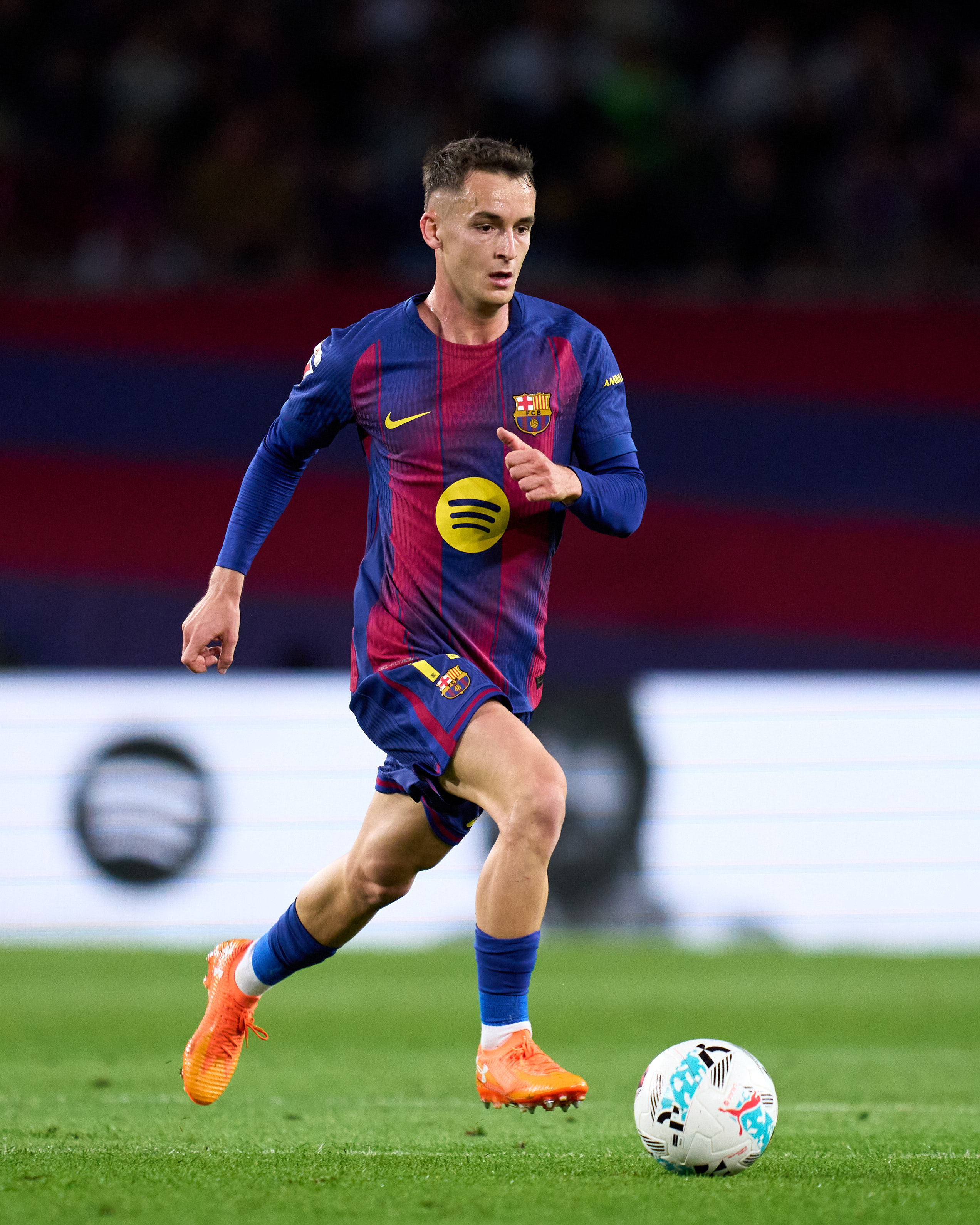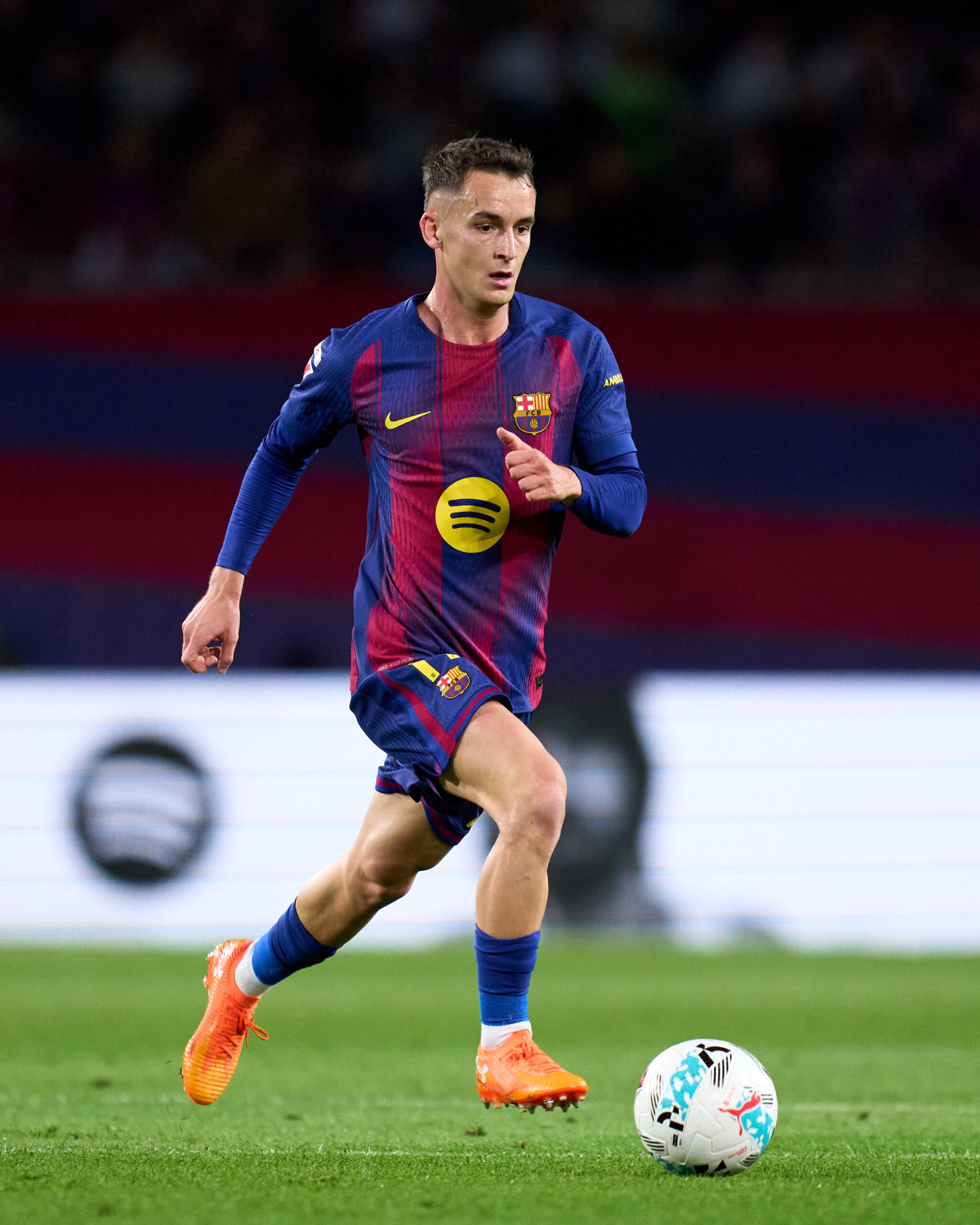Barcelona’s Marc Casadó’s Shift to Jorge Mendes Sparks a Controversial Power Play, Exposing the Sinister Agency Monopoly Over Football Dreams and Careers
Marc Casadó’s recent decision to join Polaris Sports, the agency founded by superagent Jorge Mendes, has brought to light the ongoing tension between the realities of player representation and the ethics of sports agency monopolies. This bold move not only signifies a critical juncture in the young midfielder’s career but also raises questions about the implications of such shifts within the world of football, where agency influence can shape the narratives of players and the clubs they represent.
At a mere 22 years old, Casadó’s career is on the brink of transformation. Previously represented by Wasserman, he now finds himself among a growing list of Barcelona players under Mendes’ extensive portfolio, which includes notable talents like Lamine Yamal, Alejandro Balde, and Ansu Fati. Each of these athletes embodies the spirit of Barcelona, a club steeped in a rich tradition of nurturing young talent. The question of whether these players can genuinely flourish under Mendes’ shadow, however, remains controversial.
The announcement of his agency change was not merely a transactional update; it was a carefully curated emotional spectacle. In a video filmed at the newly renovated Spotify Camp Nou, Casadó expressed his love for the club, visually narrating his journey from a fan to a player. This deep-seated connection to Barcelona reflects a sentiment shared by many young players who aspire to exemplify the values of the club. Yet, the allure of Mendes’ representation could overshadow that commitment, inviting skepticism regarding the purity of their motivations.
Mendes’ influence in football is both profound and polarizing. Widely recognized as one of the most powerful agents in the sport, his ability to broker lucrative deals for his clients has led to an undeniable monopoly that raises ethical questions. Such concentration of power can create a culture where financial gain supersedes the sport’s intrinsic values. This trend poses a broader risk not only to individual players but also to the clubs that invest in young talent, which raises concerns over whether agents like Mendes act in the best interests of the players or primarily seek to benefit themselves.
Casadó’s decision comes at a pivotal moment for Barcelona, a club grappling with financial constraints and a need for stability. In light of injuries to key players like Pedri, the young midfielder is expected to step into a more prominent role in the team’s midfield. His performance in upcoming matches, particularly against Club Brugge in the UEFA Champions League, will be closely scrutinized. The added pressure of Mendes’ oversight may influence how Casadó navigates this critical phase of his career.
The broader implications of agency representation extend beyond individual players into the very fabric of club dynamics. As Barcelona attempts to balance domestic league commitments with European aspirations, the presence of Mendes could complicate the narrative surrounding player loyalty and competitive integrity. While Barcelona’s management, led by coach Hansi Flick, emphasizes the need for stability and rest amid a busy fixture list, the spotlight on players like Casadó—a player who was once a passionate fan of the club—could turn into a double-edged sword.
The landscape of football representation is rapidly changing. Young players like Casadó are increasingly caught in the crossfire of commercial interests and the traditional virtues of club loyalty. As agencies grow in power, the potential for conflicts of interest rises. Is it possible for players to forge their own paths while navigating the demands of powerful agents? The ongoing saga of Casadó’s rise and agency shift represents just a singular chapter in a more extensive narrative of what it means to define success in modern football.
Ultimately, the conflict between agents’ ambitions and the spirit of the clubs they represent continues to intensify. The choice to align with Mendes evokes a discourse about ethical representation, the commercialization of player careers, and the long-standing traditions of revered football institutions like Barcelona. As Casadó prepares to assume a larger role on the pitch, fans and analysts alike will be eager to watch how his journey unfolds and what it signifies for the future of player representation in football.

Barcelona midfielder Marc Casadó has officially changed his representation, signing with Polaris Sports, the agency of Portuguese superagent Jorge Mendes, with a contract running until 2029. Casadó, who was previously with Wasserman, announced the move through an emotive video filmed inside the newly renovated Spotify Camp Nou.
In the video, Casadó is first seen seated alone in the stands, wearing a Barcelona shirt. It then cuts to the youngster as a fan in the streets, singing a chant. Then he walks onto the pitch wearing his current number 17 shirt.
The video highlights his passion for Barcelona with the followiong narration: “Not all dreams come true, but some live inside theirs. Marc is more than a player, he plays with the heart of a lifelong culé.”
The midfielder joins several other Barcelona players represented by Mendes, including Lamine Yamal, Alejandro Balde, Ansu Fati, Guille Fernández, and Adam Qaroual. The 22-year-old will be taking on a larger role than at the start of the season. With Pedri sidelined until after the international break, Casadó is expected to form a part of the midfield alongside Frenkie de Jong.
The announcement comes amid a busy week for Barcelona, who are preparing for their next UEFA Champions League match against Club Brugge. Manager Hansi Flick has emphasized the importance of team stability and rest, noting the challenge of balancing domestic and European competitions.

